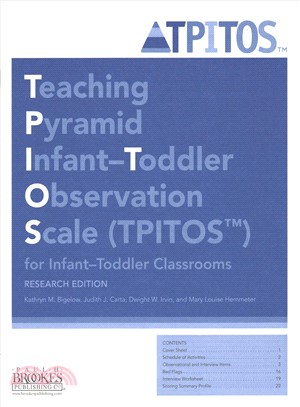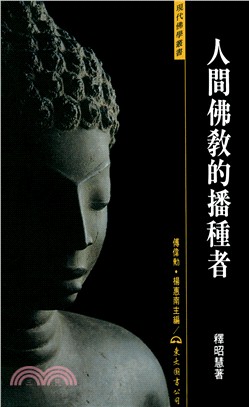Teaching Pyramid Infant-Toddler Observation Scale (TPITOS) for Infant-Toddler Classrooms ― Research Edition
商品資訊
商品簡介
Available in packs of 5, these are the 28-page forms needed to conduct the Teaching Pyramid Infant–Toddler Observation Scale (TPITOS™) for Infant–Toddler Classrooms observational assessment. A child's early teachers and caregivers play a vital role in supporting social-emotional development—and that's why more and more center-based infant and toddler programs are adopting the evidence-based Pyramid Model for Promoting Social Emotional Competence in Infants and Young Children. If your program is one of them, TPITOS™ is the essential tool you need to ensure that infant–toddler teachers are using the Pyramid Model practices with fidelity.
Modeled after the Teaching Pyramid Observation Tool (TPOT™) for Preschool Classrooms, TPITOS is for early childhood settings caring for infants and toddlers from birth to 3 years of age. Focusing on teacher practices and classroom environment variables, TPITOS measures how well your program's staff is fostering responsive, nurturing relationships with children and promoting strong social-emotional development in their earliest years.
How It Works
A trained TPITOS administrator conducts a 2-hour classroom observation, followed by an interview with the teacher being observed. The observer completes three types of items: 1) Observational Items (practices and environmental factors noted during the observation), 2) Interview Items (practices scored based on the teacher’s responses during the interview), and 3) Red Flags (practices that are not consistent with the Pyramid Model). Results of TPITOS show your program which Pyramid Model practices are being implemented effectively—and what teachers need to focus on to ensure positive social-emotional outcomes for infants and toddlers.
TPITOS helps programs:
- Ensure effective implementation of the proven PBIS-based Pyramid Model
- Support professional development efforts in center-based infant–toddler settings
- Strengthen the practices of individual teachers or caregivers, classroom teams, and entire programs
- Monitor the success of quality improvement initiatives
- Build a foundation for social-emotional competence in the critical first years of life
作者簡介
Kathryn Bigelow, Ph.D., is an Assistant Research Professor at the Juniper Gardens Children's Project in the Institute for Life Span Studies at the University of Kansas. Her research focuses on interventions for culturally and linguistically diverse children and families experiencing multiple risks. Specifically, her work has addressed early childhood language and social-emotional development and the translation of evidence-based interventions for parents, care providers, home visitors, and early intervention providers within both center-based and home-based early childhood education programs. Dr. Bigelow's work in these areas maintains an emphasis on implementation fidelity, and how technology can promote engagement and enhance the implementation of evidence-based intervention. She has been the PI or Co-PI on projects focusing on child language promotion, and on parent engagement in home visiting. Currently, she directs, with Drs. Carta, Irvin, and Hemmeter, an Institute of Education Sciences-funded (IES) research project focused on developing the Infant-Toddler Pyramid Model, a three-tiered model to promote social-emotional outcomes for infants and toddlers, based on the TPITOS.
Judith J. Carta, Ph.D., is a Senior Scientist in the Institute for Life Span Studies, Professor of Special Education, and the Interim Director of the Juniper Gardens Children's Project at the University of Kansas. Her research focuses on developing strategies to minimize the effects of poverty on children's outcomes, designing practices that teachers and parents can use to promote children's early learning and social-emotional development, methods for monitoring the progress of young children, and strategies for promoting family engagement in early intervention programs. She has been the PI of several multi-site research projects and centers funded by the National Institutes of Health, the Institute of Educational Sciences, and the Administration on Children and Families. She currently co-directs an IES-funded project to develop the Infant-Toddler Pyramid Model, a three-tiered model to promote social-emotional outcomes for infants and toddlers, based on the TPITOS. She was a member of the Federal Advisory Panel on Head Start Research and Evaluation, Division of Early Childhooda€?s Commission on Recommended Practices, and served as the Editor of Topics in Early Childhood Special Education as well as the boards of numerous scientific journals. She received the Mary E. McEvoy Service to the Field Award from the Division for Early Childhood.
Dwight W. Irvin, Ph.D., is an Assistant Research Professor in the Life Span Institute at the University of Kansas Medical Center. He was a Response to Intervention (RTI) in Early Childhood Postdoctoral Fellow at Juniper Gardens Children's Project and a Postdoctoral Scholar in Department of Education Leadership at the University of Kentucky. His research focuses on the use of wearable sensors to better understand the link between adult-child and child-peer interactions and the social competence of young children at-risk for or with identified disabilities in the classroom, home and community.
Mary Louise Hemmeter, Ph.D., is a professor in the Department of Special Education at Vanderbilt University. She teaches courses, advises students, and conducts research on early childhood issues. She is the cofaculty director of the Susan Gray School for Children, which is an early childhood program for children with and without disabilities. Her research focuses on effective instruction, social-emotional development and challenging behavior, translating research to practice, and effective approaches to professional development.
Currently, she directs an Institute of Education Sciences–funded research project focused on the efficacy of implementing the Teaching Pyramid in classrooms, and she works on the National Center on Quality Teaching and Learning and the Office of Special Education Programs–funded Technical Assistance Center on Social Emotional Interventions. She is a coeditor of the Journal of Early Intervention and serves on the editorial boards of other major journals in early childhood special education. She served as President of the Council for Exceptional Childrena€?s Division for Early Childhood (DEC) and received the Merle B. Karnes award from DEC.
主題書展
更多書展本週66折
您曾經瀏覽過的商品
購物須知
外文書商品之書封,為出版社提供之樣本。實際出貨商品,以出版社所提供之現有版本為主。部份書籍,因出版社供應狀況特殊,匯率將依實際狀況做調整。
無庫存之商品,在您完成訂單程序之後,將以空運的方式為你下單調貨。為了縮短等待的時間,建議您將外文書與其他商品分開下單,以獲得最快的取貨速度,平均調貨時間為1~2個月。
為了保護您的權益,「三民網路書店」提供會員七日商品鑑賞期(收到商品為起始日)。
若要辦理退貨,請在商品鑑賞期內寄回,且商品必須是全新狀態與完整包裝(商品、附件、發票、隨貨贈品等)否則恕不接受退貨。






















